August 2019
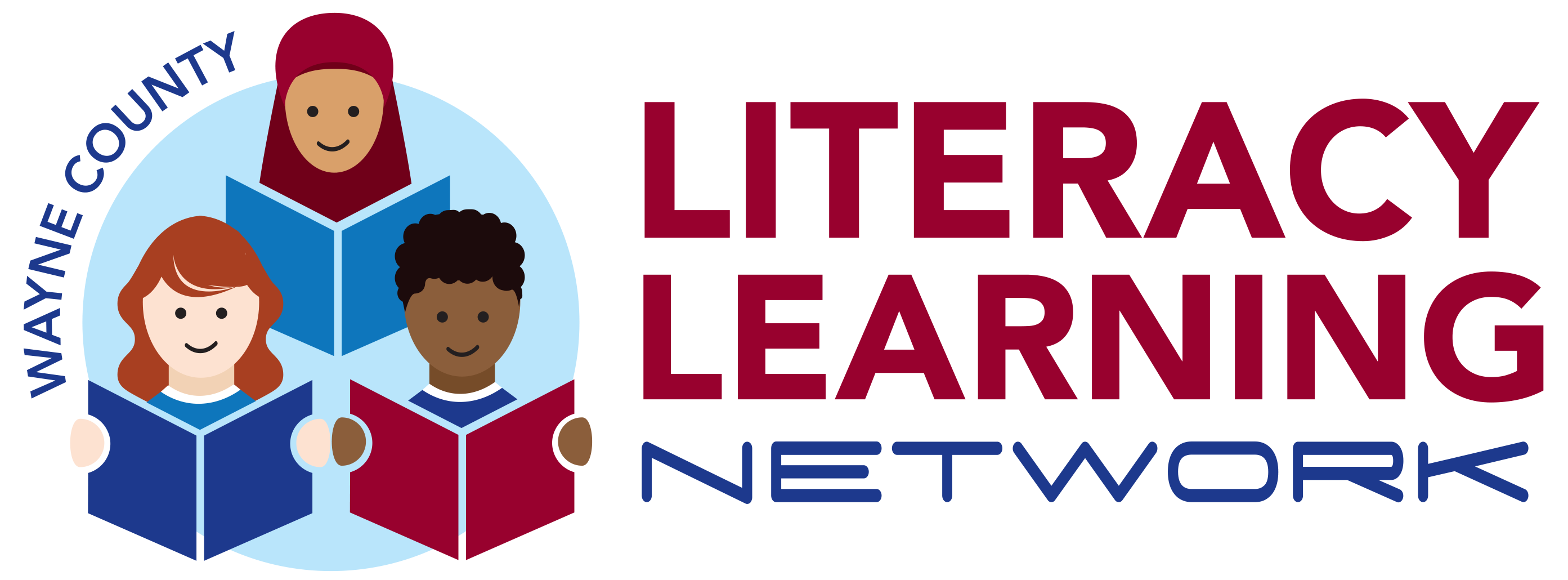
In order to support districts in creating and sustaining their literacy coaching frameworks, the Wayne County Literacy Learning Network is offering training, professional learning, and networking opportunities. Please see this coaching brochure for more information.
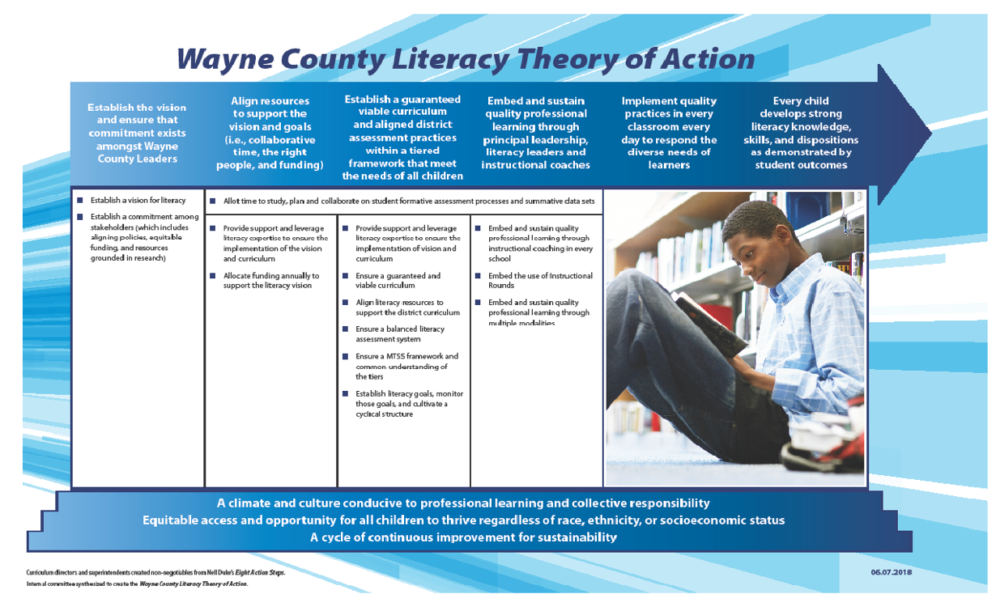
Statewide Updates
The revised MI K-12 Social Studies Standards have been approved by the Michigan Department of Education. The assumption is that schools will implement the new standards during the 2019-20 school year or when LEA’s deem it appropriate. A newly aligned M-STEP for Grades 5, 8, and 11 is not expected for another two to three years. Until then, the test remains aligned to the previous standards. If you have any questions, please contact David Hales at halesd@resa.net.
The Essential Instructional Practices in Language and Emergent Literacy: Birth to Age 3 has been published by the MAISA GELN Early Literacy Task Force and will soon be added to the comprehensive set of Essential Instructional Practices in Literacy.
The Michigan Department of Education Fall 2019 Continuous Improvement Conference is scheduled for November 18-19, 2019 in Lansing, MI. The two-day conference will focus on Meeting the Needs of the Whole Child through Systemic Thinking and will feature keynote speakers Dr. Jim Harris and Michael Fullan.
As a reminder, MDE has released the cut score for the Read by Grade 3 (RBG3) legislation (see below). Read more about the decision-making process.

As we prepare for the implementation of RBG3, MDE encourages the use of their Read by Grade Three Guide, which includes resources such as a parent tool kit and supports for EL learners. Wayne RESA has also created a comprehensive Third Grade Reading Legislation Guide with strategies for educators and families.
Literacy is one of three priorities established by MDE as part of its Top 10 in 10 Strategic Plan. The Michigan Action Plan for Literacy Excellence (MAPLE) has three goals: to align policy, funding and resources; to support research-informed instructional practices; and to support literacy leaders. More information and resources are provided on MDE’s Early Literacy page.
EduPaths has created four modules on classroom library construction. Topics include pertinent research, assessing needs through inventories, and building, sustaining, and organizing classroom libraries. 1.5 SCECHs are available upon completion of the modules.
New district and ISD literacy coaches are encouraged to reserve September 23-26 for the following introductory session: K-3 Literacy Essentials, Intro. Registration and additional information will be available soon.
The Communications Points for Early, Elementary, and Disciplinary Literacy guide has been designed to support state and local literacy leaders and educators with formal and informal communications points, including social media considerations, for the Essential Instructional Practices in Literacy documents.
Books and Strategies
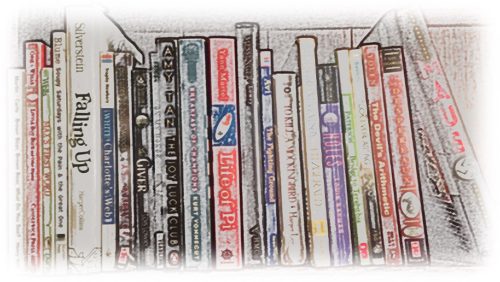
Book Talk
Igniting a Passion for History in Readers of All Ages
* in honor of the newly approved MI Social Studies Standards
Hello Lighthouse
Sophie Blackall
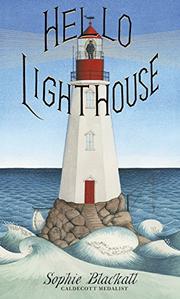 Tenderly illustrated, Sophie Blackall’s 2019 Caldecott Medal winner recounts the life of a lighthouse keeper. Isolated at sea, the keeper sends letters via bottle and awaits deliveries of flour and beans. One such delivery brings his wife, and they spend their time together keeping watch over the rough waters of the sea. Eventually, the coast guard arrives with a mechanized light that will run unassisted. The lighthouse keeper and his family move to a home on land–their beloved lighthouse within view. Blackall’s end pages supply readers with additional details about lighthouses and the many sacrifices of their solitary keepers.
Tenderly illustrated, Sophie Blackall’s 2019 Caldecott Medal winner recounts the life of a lighthouse keeper. Isolated at sea, the keeper sends letters via bottle and awaits deliveries of flour and beans. One such delivery brings his wife, and they spend their time together keeping watch over the rough waters of the sea. Eventually, the coast guard arrives with a mechanized light that will run unassisted. The lighthouse keeper and his family move to a home on land–their beloved lighthouse within view. Blackall’s end pages supply readers with additional details about lighthouses and the many sacrifices of their solitary keepers.
One Crazy Summer
Rita Williams-Garcia
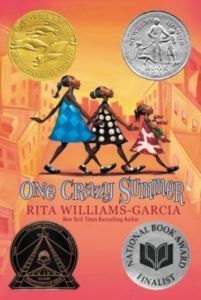 During the summer of 1968, Delphine, Vonetta, and Fern travel by plane from their loving home in Brooklyn to the green stucco house of their preoccupied and indifferent mother. Having made the cross country journey to California alone, the three young girls yearn for their mother’s affection. Instead, they discover that her work with the Black Panthers takes much of her time and effort. Despite some initial reservations, the sisters begin to understand the Panthers’ deep community support and why their mother uses her writing as a platform to resist racial injustice.
During the summer of 1968, Delphine, Vonetta, and Fern travel by plane from their loving home in Brooklyn to the green stucco house of their preoccupied and indifferent mother. Having made the cross country journey to California alone, the three young girls yearn for their mother’s affection. Instead, they discover that her work with the Black Panthers takes much of her time and effort. Despite some initial reservations, the sisters begin to understand the Panthers’ deep community support and why their mother uses her writing as a platform to resist racial injustice.
The War that Saved My Life
Kimberly Brubaker Bradley
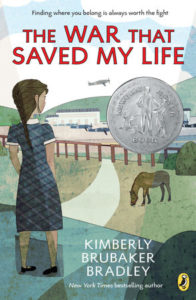 Ada and Jamie live in London with their uncaring and often cruel mother. Born with a club foot, life is particularly hard for Ada. As conflicts throughout Europe intensify, city officials decide to relocate all of the city’s children to the country. Having rarely been outside of their apartment, Ada bravely walks with Jamie to the train, moving them away from London and into the unknown. Susan Smith, an older single woman, reluctantly takes the two children in, and at first, their relationship is fraught with problems. Eventually, Ada, Jamie and Susan acclimate to each other. Susan’s genuine love frees Ada from the loneliness and isolation she experienced in London, and the three forge a family tie that cannot be broken.
Ada and Jamie live in London with their uncaring and often cruel mother. Born with a club foot, life is particularly hard for Ada. As conflicts throughout Europe intensify, city officials decide to relocate all of the city’s children to the country. Having rarely been outside of their apartment, Ada bravely walks with Jamie to the train, moving them away from London and into the unknown. Susan Smith, an older single woman, reluctantly takes the two children in, and at first, their relationship is fraught with problems. Eventually, Ada, Jamie and Susan acclimate to each other. Susan’s genuine love frees Ada from the loneliness and isolation she experienced in London, and the three forge a family tie that cannot be broken.
Mare’s War
Tanita S. Davis
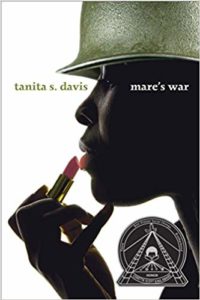 Octavia and Tali do not have the traditional, cookie-baking grandmother. Instead, she wears trendy clothes, smokes and prefers to go by Mare. Forced by their parents, the girls accompany her on a cross-country road trip. As Mare tells them the story of her turbulent young life in Alabama and her eventual escape to the Women’s Army Corps, which takes her across an ocean during World War II, the girls finally begin to understand their strong and admirable grandmother. The alternating narratives, framed by old letters and contemporary postcards, add an epistolary effect and weave together their generational stories of family, sacrifice, bravery, and resilience.
Octavia and Tali do not have the traditional, cookie-baking grandmother. Instead, she wears trendy clothes, smokes and prefers to go by Mare. Forced by their parents, the girls accompany her on a cross-country road trip. As Mare tells them the story of her turbulent young life in Alabama and her eventual escape to the Women’s Army Corps, which takes her across an ocean during World War II, the girls finally begin to understand their strong and admirable grandmother. The alternating narratives, framed by old letters and contemporary postcards, add an epistolary effect and weave together their generational stories of family, sacrifice, bravery, and resilience.
Historical Fiction for Children: Capturing the Past
Fiona M. Collins and Judith Graham
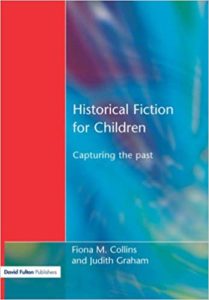 In this second edition, Collins and Graham continue to explore historical narratives and their value for young readers. The text is organized into three sections; the first, Exploring the Narrative Past, helps teachers assess and select appropriate and accurate historical fiction for their classrooms by considering what it means to write “responsibly about history.” In the next section, Writing about the Narrative Past, Collins and Graham provide accounts of authors who make pointed authorial decisions as they breathe life into their stories. Finally, in Teaching the Narrative Past, the editors include the work of teachers and their students, thereby providing educators with concrete strategies for teaching historical fiction, evoking students’ responses about literature, and enriching their understanding of history.
In this second edition, Collins and Graham continue to explore historical narratives and their value for young readers. The text is organized into three sections; the first, Exploring the Narrative Past, helps teachers assess and select appropriate and accurate historical fiction for their classrooms by considering what it means to write “responsibly about history.” In the next section, Writing about the Narrative Past, Collins and Graham provide accounts of authors who make pointed authorial decisions as they breathe life into their stories. Finally, in Teaching the Narrative Past, the editors include the work of teachers and their students, thereby providing educators with concrete strategies for teaching historical fiction, evoking students’ responses about literature, and enriching their understanding of history.
Bringing the “Social” Back to Social Studies
Deborah Macphee and Emily Whitecotton
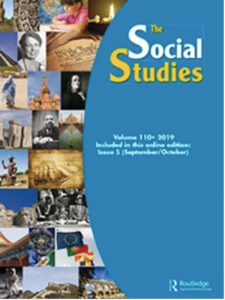 Macphee and Whitecotton present the notion that literacy skills should not be taught separately but as “…communicative practices that support all learning.” They demonstrate this through a unit on the Revolutionary War in two fourth grade social studies classrooms. The teachers used the historical fiction Chains, nonfiction texts (articles, trade books and the social studies textbook), and the big idea of “power” to fuel their lessons. The authors concluded that by using the characters and plot of the story Chains as a means of building empathy, the students were able to process and apply the nonfiction Revolutionary War facts in a deeper way when they were given the opportunity for discussion and time to write. Finally, by using intentional reading, writing and discourse to push students’ thinking, the teachers elicited their students’ critical, civic, and reflective thinking.
Macphee and Whitecotton present the notion that literacy skills should not be taught separately but as “…communicative practices that support all learning.” They demonstrate this through a unit on the Revolutionary War in two fourth grade social studies classrooms. The teachers used the historical fiction Chains, nonfiction texts (articles, trade books and the social studies textbook), and the big idea of “power” to fuel their lessons. The authors concluded that by using the characters and plot of the story Chains as a means of building empathy, the students were able to process and apply the nonfiction Revolutionary War facts in a deeper way when they were given the opportunity for discussion and time to write. Finally, by using intentional reading, writing and discourse to push students’ thinking, the teachers elicited their students’ critical, civic, and reflective thinking.
Nurturing Literacy Skills through Social Studies and History

In March, Dr. Nell K. Duke published a video entitled Speaking Up for Science and Social Studies; in it, she urges elementary-level teachers to consider the long-term detriments students face when instruction in science and social studies is limited or ignored. Quite simply, students miss important opportunities to learn about the world. Her plea, coupled with the Essential Instructional Practices in Literacy documents, pushes educators to reevaluate what reading, writing, listening, and speaking look like across disciplines. In essence, communicative practices shift according to discipline, but they are communicative practices nonetheless. As Dr. Tanya Wright, leading literacy educator and researcher, asserts, “Content area learning supports literacy development.” At the elementary level, along with learning about the world around them, students are exposed to new words and their meanings, can make interdisciplinary connections through reading and writing, and have access to a wider range of reading materials that may be better suited to their interests and
backgrounds. At the secondary level, social studies and history teachers can enrich instruction by making their students apprentices who frame common disciplinary problems and use literacy skills to solve them. For example, in a history or social studies course, teachers can pose particular economic, social, historical or political questions and allow their students to research, write about, discuss, and/or present potential answers. By embracing disciplinary literacy practices, students begin to understand that literacy is not confined to the ELA block or classroom. In fact, communication practices stretch beyond a students’ education into their careers. Perhaps most important, “as Lee (2007) has eloquently argued, knowledge and skill in the subject areas is essential to supporting young people in becoming active participants in a democratic society” (as cited in Moje, 2009).
Building a Classroom Library

Penny Kittle, leading author and secondary educator, envisions classroom libraries with books for every reader. A passionate advocate for building students’ interest and skills in reading and writing, Kittle asserts, “We can change the story of reading. We have to. Every child. Every year. Every classroom. Book Love–pass it on.” As part of this effort, she created the Book Love Foundation in 2013. Over the past six years, the Foundation has given out $500,000 in grants to over 200 teachers. This year, Selma Agic and Jessica Madden, English teachers at Hamtramck High School, were among the 66 recipients of Book Love Foundation grants. Eager to build culturally relevant and personally engaging classroom libraries for their diverse students, these Wayne county teachers filled out the comprehensive grant application. Their advice to future applicants includes the following tips:
- Start your classroom library no matter how few your resources. Selma and Jessica built their libraries over the years by ordering books and adding on with books picked up from library sales, garage sales, discount stores, special splurges, and their favorite community resource–Tiny Libraries. They also received a donation of a number of gently used books from a local book store, coordinated by the Delta Kappa Gamma teaching sorority. Most of the books they have added are led by students’ interests and wish lists. They also keep on top of new titles by following Penny Kittle’s reading lists, ALAN lists, The New York Times Best Books for Teens, and NCTE. Additionally, they swap titles with colleagues and students. It’s catchy to share excitement over books. Teachers can watch the enthusiasm in their classrooms grow as their library selections increase. On the grant application, Selma and Jessica shared the story of their classroom libraries. They listed books and authors their students love and why those titles fit in their classrooms.
- Join professional organizations to keep current on new research and to gain confidence and support in your teaching practice. NCTE, Michigan Reading Association, and International Reading Association all support choice reading and developing a reading diet that is culturally relevant, culturally diverse, and varied in content and text types. When applying for grants, Selma and Jessica encourage teachers to share what they’ve learned through these organizations, including their academic interests and topics they want to know more about.
- Develop a close relationship with WRESA. Over the years, Selma and Jessica have been very fortunate to have participated in a variety of professional development workshops through WRESA on many topics, such as reading and writing workshop, teaching young adult literature, socratic seminar, raising achievement in African American males, working with struggling readers and writers, trauma informed training, restorative practices, SAT preparation, and social emotional learning workshops. Throughout all of these trainings, they have made connections to WRESA coaches and facilitators who have been eager to be invited into classrooms and share their expertise. Selma and Jessica have welcomed them as partners, learning from them and beside them; particularly, Dr. Rosalyn Shahid has been an invaluable resource for both teachers. On their application, Selma and Jessica shared what they’ve learned from WRESA, both material and immaterial. They also were able to ask for recommendation letters because of the time spent attending WRESA programs and working with WRESA consultants.
- Show your journey with stories, pictures, and data. Even though a grant is a formal application, these teachers chose to illustrate their need through stories. They drew upon their own unique life circumstances and those of their students. They described their own and their students’ personal reading journeys. With permission, they shared pictures of their classrooms and their students with favorite books. Finally, using student surveys and other classroom data, they shared evidence of the importance of classroom libraries based upon the amount of books read and reading growth in their students.
- Read young adult literature. We are living in a time where the stories told through YAL are informative, intriguing, and inspiring! There are so many great books, and we know how little time teachers can have to read. Reading YAL, though, is often not as challenging as many of the difficult texts teachers wade through with their students. It is often a relaxing break from administrative duties and home responsibilities. As mentioned before, teachers are able to build relationships with students and enrich the literacy in their classrooms when sharing these works together.
Building a classroom library is an ambitious undertaking. In recognizing this level of effort and commitment, the Book Love Foundation describes Selma Agic and Jessica Madden as “models, through their lives and teaching, of how the right books and the right classroom community can have a lifelong impact on students.”
Professional Learning
Confused about terms like project-based learning and standards-based grading? Education Week has created an animated glossary to help educators sort out these common assessment terms.
Wayne RESA’s Great Start Readiness Program (GSRP) is airing campaign ads through iHeart Media in August. The campaign’s primary goal is to increase community awareness and attract eligible 4-year-old children and their families that might otherwise go unserved.
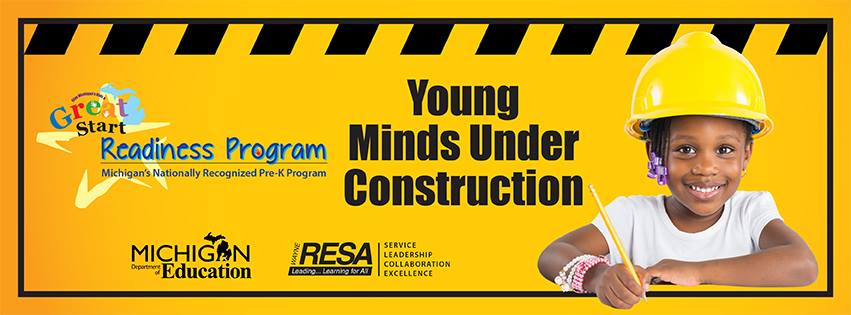
Mari Treece, Manager of Educational Services at Wayne RESA, introduces the history and vision behind the formation of the Wayne County Literacy Learning Network and its commitment to excellence in literacy instruction throughout Wayne county schools.
| Upcoming Events at Wayne RESA |
| Online registration for professional learning is available in Wisdomwhere. All course offerings and their descriptions can be found in the ELA PD Course Offerings 2019-20 brochure. |
| Early Literacy |
| Pre-Kindergarten Essential Instructional Practices in Early Literacy: September 27, October 4, November 1, December 6, January 24, February 28, March 27, and May 1 (half-day workshops – choose all dates – Cohort 1 meets in a.m. OR Cohort 2 meets in p.m.) |
| Research has shown that literacy knowledge and skills developed in the preschool years predict later literacy achievement. To ensure young children are well-prepared to reach the “reading-by-third grade” mandate, it is vital that prekindergarten programs implement the ten research-based best practices included in the GELN document, Essential Instructional Practices in Early Literacy: Pre-Kindergarten. This series of eight half-days will provide an introduction to these essential instructional practices and will explore developmentally appropriate strategies for implementation in early childhood programs. Registration for each cohort is linked above. |
| Elementary |
| K-2 Real Data to Inform Real Teaching: October 28 and November 11 |
| Wanting to take a closer look at student literacy data and be confident in analyzing and determining next-step teaching points? Join this two-day professional development opportunity to unpack how a variety of observation and assessment tools can empower student learning and help teachers be strategic during individual conferences and small group settings. The intended audience for this course is teachers of grades K-2, reading specialists, and literacy coaches. It is recommended that participants have previously attended the Pathways to K-5 Reading Proficiency series or the Essential Instructional Practices in Early Literacy roll-out through MAISA GELN. (This series will focus on K-3 Essential Instructional Literacy Practices #3 and #9.) |
| Grades 3-5, Real Data to Inform Real Teaching: November 26 and December 16 |
| Wanting to take a closer look at student literacy data and be confident in analyzing and determining next-step teaching points? Join this two-day professional development opportunity to unpack how a variety of observation and assessment tools can empower student learning and help teachers be strategic during individual conferences and small group settings. The intended audience for this course is teachers of grades 3-5, reading specialists, and literacy coaches. It is recommended that participants have previously attended the Pathways to K-5 Reading Proficiency series or the Essential Instructional Practices in Early Literacy roll-out through MAISA GELN. (This series will focus on K-3 Essential Instructional Literacy Practices #3 and #9.) |
| I AM a Writer! Strategies to Promote Engagement & Independence in K-2 Writers: December 5, February 13, and April 16 |
| Are you looking for ways to strengthen your students’ engagement, skill, and independence as writers? In this foundational series, participants will explore effective classroom structures and strategies that support engagement in authentic, sustained writing. As they examine key components of the writing process and the architecture of a one-to-one conference, participants will refine their skill in noticing and naming writers’ strengths and challenges to determine next steps for instruction. Modeled and interactive writing strategies and the use of mentor texts will be highlighted as powerful models of what writers do and inspiration to build young children’s identities as writers themselves. Featured in this series will be national literacy consultant, Lisa Cleaveland, coauthor with Katie Wood Ray of About the Authors and A Teacher’s Guide to Getting Started with Beginning Writers, Grades K-2. The intended audience for this course includes K-2 teachers, teachers of striving third grade writers, reading specialists, literacy coaches, and members of the leadership team. It is recommended that participants have previously attended a Pathways to K-5 Reading Proficiency series or the Essential Instructional Practices in Early Literacy roll-out through MAISA-GELN. (This series will focus on K-3 Essential Instructional Literacy Practices #1, #2, #6, and #9.) |
| I Am a Writer! Essential Practices to Foster Engagement and Independence in Intermediate Writers, Grades 3-5: October 14, February 3, and May 12 |
| Are you looking for ways to strengthen your students’ engagement, skill and independence as writers? In this foundational series, participants will explore effective classroom structures and strategies that support engagement in authentic, sustained writing. As they examine key components of the writing process and the architecture of the one-to-one conference, participants will refine their skill in noticing and naming writers’ strengths and challenges to determine next steps for instruction. Modeled writing strategies and the use of mentor texts will be highlighted as powerful models of what writers do and inspiration to build students’ identities as writers themselves. Participants will have the opportunity to explore the use of digital tools in today’s writing classroom. Featured in this series will be national literacy consultant Leslie Blauman, author of Kid-Tested Writing Lessons for Grades 3-6 and The Inside Guide to the Reading-Writing Classroom. Blauman’s classroom is also featured in the Strategies that Work Video Series. Participants will receive professional writing resources. The intended audience for this series is teachers of grades 3-5, reading specialists, literacy coaches, and members of the leadership team. (This series will focus on Grade 4-5 Essential Instructional Literacy Practices #1, #2, #6 and #9 as well as the corresponding K-3 Essential Instructional Literacy Practices for Grade 3.) |
| Leveled Literacy Intervention, K-2: November 20, November 21, and February 26 |
| The Fountas and Pinnell Leveled Literacy Program System (LLI) is a scientifically-based early intervention program designed to prevent literacy difficulties before they turn into long-term challenges. Participants will learn effective small group instructional strategies to provide the intensive support necessary for some primary students to achieve grade level competency in reading and writing. This program also specifically supports the unique needs of English Language Learners. This three-day workshop series will be led by Heinemann Literacy Consultant Dale Severyn, who will share her expertise as a reading specialist and certified Reading Recovery teacher leader. Enrollment in this series is limited to 30 participants, so early registration is recommended. Participants must bring to each session an orange, green, or blue LLI grade level kit (not included in this series). |
| Leveled Literacy Intervention, Grades 3-5: November 18, November 19, and February 25 |
| The Fountas and Pinnell Leveled Literacy Program System (LLI) is a scientifically-based early intervention program designed to prevent literacy difficulties before they turn into long-term challenges. Participants will learn effective small group instructional strategies to provide the intensive support necessary for some intermediate students to achieve grade level competency in reading and writing. This program also specifically supports the unique needs of English Language Learners. This three-day workshop series will be led by Heinemann Literacy Consultant Dale Severyn, who will share her expertise as a reading specialist and certified Reading Recovery teacher leader. Enrollment in this series is limited to 30 participants, so early registration is recommended. Participants must bring to each session a red, gold, or purple LLI grade level kit (not included in this series). |
| Lisa Cleaveland – Writing Right from the Start – Fostering Independence in Beginning Writers: December 5 |
| Join author, national literacy consultant, and master primary teacher, Lisa Cleaveland, to learn best practice in writing instruction. During this foundational workshop, participants will learn the basic tenets of what it means to be a writer, effective classroom structures that support engagement in authentic, sustained writing, and a “gradual release” instructional model that scaffolds primary writers’ growth toward independence. The intended audience for this course is K-2 teachers, reading specialists, literacy coaches, resource room teachers, and members of the leadership team. |
| Overview of the GELN Essential Instructional Practices in Literacy, Grades K-5: September 16, 2019 OR January 9, 2020 |
| Have you heard the phrase “minimum standard of care”? Are you familiar with how this phrase connects with literacy practices in our K-5 classrooms? If you are curious about these questions and how it can impact your teaching, then this session is for you! Come and learn about the MAISA GELN ELTF Essential Instructional Practices in Literacy. In this session, participants will be provided with an overview to the K-3 and 4-5 Essential Instructional Practices in Literacy. Participants will spend time learning about motivation and engagement and the critical role these play in all aspects of literacy development as well as the other 9 essentials. As each of the 10 essentials is introduced, participants will be given time for reflection and action planning; therefore, school literacy teams and/or grade level teams are encouraged to enroll together. This session could serve as a springboard to build ideas for professional learning linked to school improvement. All participants will receive their own printed copy of the MAISA GELN ELTF Essential Instructional Practices in Literacy for Grades K-3 & 4-5. |
| Pathways to 3rd Grade Proficiency: Essential Instructional Practices for Early Literacy: November 19, December 5, February 4, February 25, March 11, and April 15 |
| In this series, participants will dive into MAISA GELN ELTF Essential Instructional Practices in Early Literacy: Grades K to 3 , as they study ten essential research-based practices to enhance their capacity to guide and support students’ development toward 3rd grade reading proficiency. Participants will explore key components of a balanced literacy program, including: strategies for developing engagement, stamina, and independence; creating a thriving writing community to support skill and agency in both reading and writing; building necessary foundational skills for automatic in-print processing; using assessment data to plan targeted small group instruction; using interactive read aloud to build background knowledge and expand vocabulary; and developing specific strategies for deep comprehension of increasingly complex text. National early literacy consultants featured in this series will include Lisa Cleaveland and Jan Richardson, who will share research-based instructional strategies for accelerating K-3 students’ growth in literacy toward career and college readiness. Participants will also receive mentor texts and other resources to support literacy instruction. The audience for this 6-day series includes K-3 classroom teachers, reading specialists, literacy coaches, and members of the leadership team. |
| Secondary |
| 8th Grade PSAT 8/9 Instructional Shifts: October 1, 2019 – OR – February 5, 2020 |
| This course is designed to provide participants with key information and instructional shifts for the PSAT 8/9. The PSAT replaces the M-STEP English Language Arts (ELA) and Mathematics assessments. Participants will understand the PSAT 8/9 test structure, review sample items, and identify the instructional shifts necessary to best support students on this assessment. Registration is coming soon! |
| Coaching |
| Building Coaching Strategies – Entering into the Conversation: November 6, November 7, and December 4 |
| In this learning series, coaches will explore their current beliefs and how those beliefs might facilitate or debilitate the relationship with a teacher. This training will provide coaches with the knowledge, skills, and dispositions to shift teachers’ thinking from responding “This is how we have always done it” to considering new possibilities. Coaches will acquire a vast array of effective coaching skills to mediate the thinking of the teachers they coach. This will enable the teachers to think deeply about their practice, and to monitor and adjust as necessary. Coaches will understand the link between effective coaching and the transformation of teacher practice. The intended audience is instructional coaches and literacy specialists, though it is appropriate for anyone in an instructional coaching role. |
| Wayne County Coaching Foundations: October 21 OR March 2 (each face-to-face date is followed by six online sessions) |
| Designed as a boot-camp for new and prospective coaches, this series examines key components of coaching. Join us as we explore what literacy coaching is and how it can lead to systemic improvement within a school or district. In this foundational course, we delve into the skills necessary to be an effective literacy coach, including nurturing a growth mindset, developing relational trust, active listening, meaningful use of data, and providing effective feedback. Discover how the Essential Coaching Practices in Elementary Literacy connect with the other components of the Essential Instructional Practices in Early and Elementary Literacy and learn how to integrate these core elements into successful practice. The intended audience for this course is new or aspiring literacy coaches. |
| Wayne County Coaching Network: October 15, November 19, January 21, March 17, and May 19 |
| This newly designed network offers opportunities for deep study of research-based practices using collaborative inquiry (Problems of Practice), common texts, and discussion of the Essential Coaching Practices in Elementary Literacy. Building and sustaining relationships between both teacher-coach and principal-coach roles, developing assessment literacy knowledge and skills, and promoting equity through coaching will be unpacked. Forums led by district coaches will provide additional focused learning. The final session of the series will be a celebration of our growth. The intended audience for this course is new or experienced literacy coaches. |
| District Leadership |
| Leadership-driven Coaching for Sustained Success: August 14 OR September 13 (plus five additional one-hour online sessions) |
| The building leader is integral to sustaining an effective coaching model. When employed and supported effectively, literacy coaching strengthens classroom instruction by improving teacher expertise, provides sustainability to district professional development systems and promotes student achievement. This series will explore the characteristics of effective building level implementation and sustainability of coaching and the role that leadership plays in that success, including a healthy principal-coach relationship. For more information, contact Mellissa Wilson. |

Resources: Where can I find...
With its extensive database of images, Storybird will inspire writers at all levels of expertise. Educators can also access teaching guides and other resources aimed at improving students’ writing skills. Not sure if Storybird is for you? Try the 30-day free trial!
Whether generating a space for group projects, presentations, or discussions, student collaboration can be easier with Sutori. Additionally, teachers can embed other educational applications, such as Quizlet or Google docs, and Sutori is compatible with a variety of learning management systems.
Wayne RESA Literacy Team
We look forward to hearing from you!
Laura Gabrion
Debbie Reeves
Bridget Regan
Rosalyn Shahid
Mary-Lu Strimbel
Mari Treece
Michelle Wagner
Colleen Whalen
Mellissa Wilson
If you’d like to subscribe to this newsletter, please contact Laura Gabrion
![]() 33500 Van Born Road • Wayne, MI 48184 • 734.334.1300 • 734.334.1620 fax • www.resa.net
33500 Van Born Road • Wayne, MI 48184 • 734.334.1300 • 734.334.1620 fax • www.resa.net
Board of Education
James S. Beri • Mary E. Blackmon • Danielle Funderburg • Lynda S. Jackson • James Petrie
Randy A. Liepa, Ph.D., Superintendent
“Use Your Megaphone”: Inspiring Excellence in Literacy Instruction Read More »